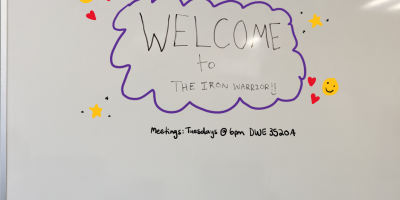Thanks to all the writers and copy editors who are making this paper happen over a holiday weekend! Thanksgiving is an unusual holiday in that it is secular: while most holidays have a religious background, Thanksgiving, with its roots in a harvest festival, can be enjoyed by everyone regardless of their religious beliefs.
We all have a certain set of beliefs. Whether it’s about politics, religion, philosophy, or just a favourite movie, we go through life with opinions and values that form our criteria for making decisions. However, sometimes there are situations outside our realm of experience and sometimes, as time goes by, things happen that don’t sit comfortably with our beliefs.
Maybe the politician you support gets elected and doesn’t live up to expectations, maybe you form relationships with people who have different faiths, or maybe you get into a really intense argument about the ending of Inception. At these points, you may be asked to defend your beliefs or you may just feel that they need new scrutiny in the face of this new information.
Even if you have never had your beliefs challenged, that doesn’t mean that you should be complacent. We don’t know everything (and we never will, but that isn’t a reason to stop learning) and our beliefs were not formed with perfect information. Every so often, when you find yourself making an assumption, stop and question it. Why are you assuming this? What belief is it based in? What is the source of that belief? Supposing your assumption to be wrong, what are the consequences?
Be very, very wary of any baseless belief. If your answer to any “Why?” is “It’s obvious”, then perhaps you need to think some more. It might not be so obvious to someone else. If that’s your argument, you definitely have no hope of convincing any skeptic; beyond that, if it isn’t obvious to everyone, that puts your “proof” into serious doubt. The great philosopher René Descartes even felt the need to prove the fact of existence, and he promptly came up with a proof — not because he doubted it, but if the logical foundation of any argument is weak, you risk your whole edifice coming down. If you ever find yourself having a knee-jerk reaction, making a judgement or decision without thinking through both sides, stop and ask “why?” If the answer comes too easily, if it’s what you’ve always done or what your kindergarten teacher told you or just feels more comfortable, question that as well.
For almost everyone, our first source of information is our parents. Even the most broad-minded parents generally instill their values into their children from a young age. Some people strongly oppose this, especially in the cases of religion and politics, calling it “indoctrination”. True, there are some parents who brainwash their children into extreme and harmful beliefs, but as the old adage goes, extreme cases make bad law. Humans are a K-selected species, after all; we invest heavily in our young, who need to develop a great deal before they are ready to survive on their own. Most parents want their children to be successful and try to give their children the best and most helpful information they can.
However, that obviously does not mean that parents are necessarily a good source of information. No one is perfect, and the world, society, scientific knowledge, and people’s personal situations are constantly changing. For many of us, our parents’ teachings from childhood are the source of our deepest beliefs, the ones we question the most rarely, and the ones we are least aware of. They should still be questioned; in many cases, you will find that Mom and Dad were right but you shouldn’t just assume that. Think through what you were told as a child, see if it stands up to logical scrutiny, and seek out other pieces of evidence. Even if everything you find confirms that the original belief was correct, now you are capable of defending your opinion that much better.
Another source of information, and one of the most trusted, is, of course, school. Nonetheless, what you learned in school was often out of date, incorrect, or taught by an imperfect teacher. And, of course, sometimes there is an agenda behind what is taught in schools. I am not speaking of some cabal spreading misinformation to a perverse end (although that has happened in human history; don’t declare it laughable out of hand), but what is taught in school is the reflection of an imperfect society. Civics class might have taught about the official structure of government. Did it teach you how to spot a politician’s lie? Did it teach you how to analyze and learn from history? History class is full of slant, orthodoxy, and lies of omission. Notice the biases. Question the dogma. Seek out information that was omitted. Just because something is officially taught, it doesn’t make it true. It doesn’t even make it more likely to be true.
Other sources of information include the media, peer groups, and society at large. What media do you consume? Is it limited to ones that confirm your opinions? In these days, where a thousand algorithms determine which advertisements and which websites you see, beware projecting your biases onto the world and receiving a comforting echo in return. Do your friends mostly think like you? Are you exchanging ideas, or just patting each other on the back? Do you trust what your friends say, without learning where they got the idea? “I read…” – where? “Studies show…” – which studies? “So-and-so-says…” – is that actually what they said? This is not meant to encourage distrust; rather, carefulness.
While no one would argue that society is perfect, it does nevertheless exert a tremendous influence over everyone. This is not merely peer pressure; society also largely determines what ideas you are exposed to and which ones are seen as reasonable. In history, there have been many societies with values that today we find nonsensical or abhorrent. Just because a value is mainstream in society, that doesn’t make it correct.
Most insidiously, the idea of society is often used as a cudgel to get heretics to conform. Often, an idea is promoted as being good for society—which is based on the false assertion that society is an actual thing—which is of paramount importance. However, society does not, as such, exist. There is no entity called society, which is benefited or harmed by good or bad behaviour; society is the cumulation of individual values and actions. Political or moral ideas are not good or bad for society, they are good or bad for various individuals. If they are good for some individuals and bad for others, then there is a decision to be made—but keep “society” out of things. “This will benefit society” is a meaningless statement. “This will benefit Alice and harm Bob and Charlie”: now that is a statement that forces you to think through the consequences of the idea. This is especially important to remember, as supposed benefit to society is often used to excuse ideas that will harm individuals.
To make rational decisions, your criteria for decision-making should follow a logical chain. Keep asking yourself “Why am I making this decision? Is that a valid reason? Why do I believe this?” Eventually, of course, you will have to accept something as an axiom. Whether that axiom is a conviction, a philosophical principle, even a biological drive, that is your last line of defense. The validity of your idea hangs on it, so consider your basic principles very carefully. Keep re-visiting them. If you don’t find them completely convincing, don’t expect anyone else to if you express them as opinions. There is no reason to live with a lack of faith in your own principles.
Finally: there is nothing shameful about changing your mind. Humans hate to admit that we were wrong, even to ourselves; this is another manifestation of the irrationality we must work to keep at bay. It is a blow to our pride, but it is very necessary. How many misconceptions did you have as a child? Do you remember them with any embarrassment? Many of us do, at least a little. But when a child says something ridiculous to you, do you belittle them? Do you think less of them for it? Of course not! All of our minds expand as we gain more experience, and some of our early ideas are always wrong. Changing your mind does not mean that you were previously stupid; it simply means that you have gained new experience and have been wise enough to re-assess your positions in that light.
Assumptions are comforting. They take the burden of thinking out of daily life. However, they can also be deeply harmful to ourselves and those around us. Our decisions, even minor daily ones, can have far-reaching effects, and it is our responsibility to make informed and rational decisions. Add one more step to your decision-making process: instead of just considering what you should do, and your reasons for doing it, also consider what makes those reasons valid. What values are they based in? Are those values logical ones? What evidence supports them? What arguments are there against them? What will happen if you are wrong?




Leave a Reply